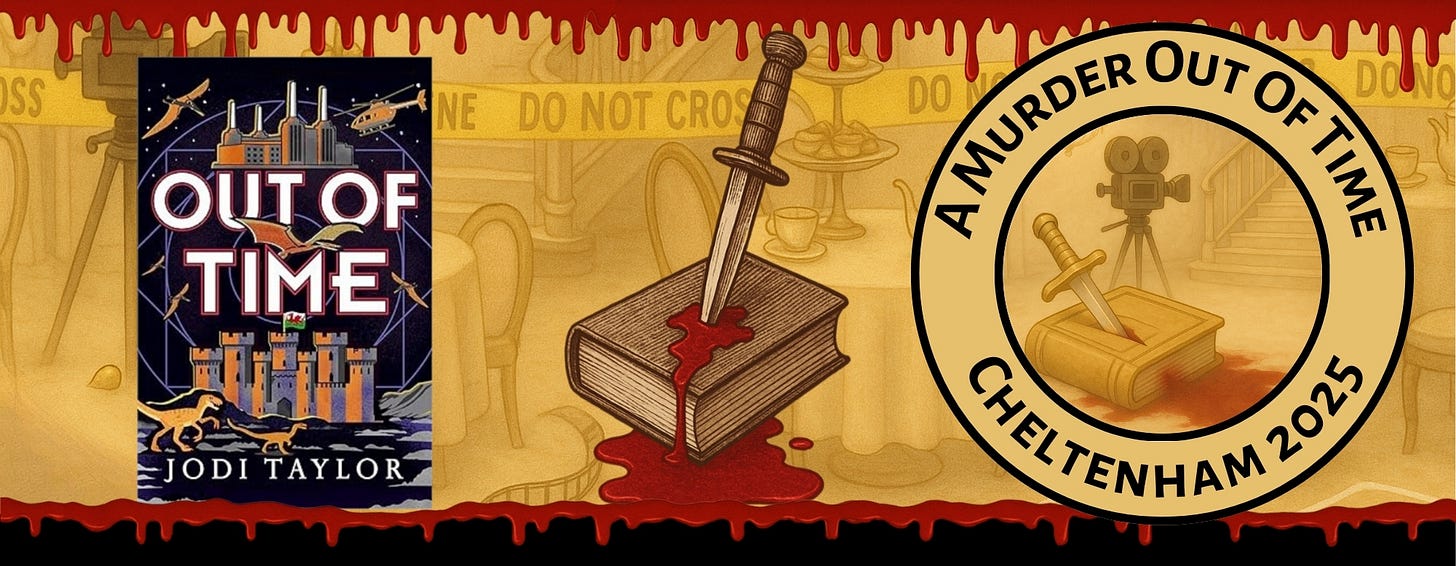It's Friday - What Can Possibly Go Wrong?
A weekly newsletter from Jodi Taylor - 5th September 2025
This week we have:
A David Sands Writing Competition entry: The Joy of Sigz by Julia Hawkes-Moore
This Week in History: On 8th September 1760, George III ascended the British throne
Guest post from Hazel Cushion: Tales from my honeymoon in Venice
Jodi Taylor Book Recommendation: Project Hail Mary by Andy Weir 💙📚
A joke from the #SillySunday thread in Jodi’s Fans and Readers Facebook Group
The Book of the Month is About Time by Jodi Taylor
There’s plenty to read this week and you can see everything new on the blog too. CLICK HERE for the blog.
The countdown is nearly over! We’re just weeks away from gathering in Cheltenham for an extraordinary weekend — the Murder Mystery Launch of Out of Time, the sixth thrilling instalment in Jodi Taylor’s Time Police series. On 27–28 September, fans from near and far will come together for an afternoon tea with a twist, an immersive mystery to solve, and, of course, the chance to celebrate a brand-new adventure from Jodi.
The Joy of Sigz
A David Sands Competition story by Julia Hawkes-Moore
After the Catastrophe, it had taken only one generation of Humankind for Sigz to become universal. How long had Sigz been present on planet Earth? The general Scientific opinion was forever, but humans had only glimpsed them as as haloes, auras, orbs, will-of the wisps, dust-devils. They were now considered as Angels. I hated them.
The great Storms which hurled themselves across post-disaster Earth were no issue for the Sigz. Fraught with ancient passions, riders could bob, soar, dive and dip with glee - or fury at the profound global losses. The injured and disabled, like Lazarus, stepped up from their wheelchairs into airy freedom. Many just shuddered and shivered with panicked misery for hours and days, before some stability was restored by the Sigz caresses. I tried to help, but was too angry to be tolerant of whingers. There was too much to do, and no-one else was doing anything!
Sigz initially gathered like shuddering bunches of grapes around any working communications towers, but as devices ran out of charge, that stopped. There was no news, no more explanations. Flashing a light was enough for a Sig to be approached by others, to converse and soothe.
Sigz had no agenda, they just wanted to serve with joy. They first became popular in the North, as refuge from snow and ice. However polluted, cold or hot the air around, the Sigz temperature was fresh and perfect for it’s rider. The awkwardness of clothes was banished. As pet-keeping necessarily fell out of fashion, Sigz met all needs for tactile delights at their owners’ whims.
As clothes decayed, everyone became naked as they had arrived on the planet. The translucence of each Sig provided privacy as the owner wished. Each dimmed to black as the owner slept within. I could not stab or pierce or even prod a single Sig.
Lovers could merge their Sigz into luminous revolving balls of marbled passion. Making more babies became the sole purpose of many humans. There was no consideration of what hell those babes were being born into. Waiting beside a mother giving birth was a glowing ball of light ready to envelop and protect the new-born child. I beheld a triplet mother have three Sigz waiting happily, gently bobbing in anticipation. As each babe was held up into the air for the first time, their Sig melded around the fragile new body, cleansing and purifying, caressing and warming. Staying fused with the Sigz of their parents, until teenagers stepped away entirely into their own Sig. Scientists studied the length of tendrils of connection between families, stretching out until micro-cellular. Impossible to snap or cut, yet never tangling. Believe me, I tried to slice that umbilical cord in every way I could, and failed.
This Week in History: King George III: Britain’s Long-Serving and Often Misunderstood Monarch
On 8th September 1760, following the death of his grandfather, George II, George III ascended the British throne. At just 22 years old, he became the first monarch of the Hanoverian line to be born in Britain and to speak English as his first language. His reign would stretch for six decades, making him one of the longest-serving monarchs in British history.
George William Frederick was born in London in 1738. Unlike his Hanoverian predecessors, who had strong German ties, George was raised in England and carefully educated to embrace his role as a “British” king. He was dutiful, serious-minded, and deeply religious, with a strong sense of responsibility towards his kingdom. On becoming king, he declared, “Born and educated in this country, I glory in the name of Britain.”
George III’s reign coincided with an era of dramatic change. Internationally, Britain emerged as a major global power, but not without turmoil. The loss of the American colonies after the War of Independence (1775–1783) was a bitter blow, and George was often criticised for his determination to retain them under British rule.
A Venetian Bacari Bar Crawl - Tales from my honeymoon in Venice
Stepping out of Venezia Santa Lucia station is like walking onto a stage set. The Grand Canal lies directly ahead, gondolas bobbing, vaporetti sliding past and a cacophony of noise and people. Venice doesn’t ease you in gently — it sweeps you up. And the best way to fall under its spell, we discovered, was to avoid the crowds and the tourist hot spots. Instead, especially as my husband is a chef, we choose to discover the more authentic parts of the city following the trail of some of the city’s bacari.
These little wine bars, scattered through the labyrinth of calli (narrow streets) and campos (squares), are where Venetians pause for an ombra (a small glass of wine) accompanied by cicchetti, those jewel-like snacks displayed along the counter. To spend a day wandering from one to the next is to taste Venice in its truest form.
Jodi Taylor Book Recommendation: Project Hail Mary by Andy Weir 💙📚
An irresistible interstellar adventure as only Andy Weir could imagine it, Project Hail Mary is a tale of discovery, speculation, and survival taking us to places we never dreamed of going.
Have you enjoyed this book too?
A joke from the #SillySunday thread in Jodi’s Fans and Readers Facebook Group
This week’s joke is from Julie Cox:
I've just watched a play about Angling.
Great cast...
The Book of the Month is About Time
This is the fourth book in the Time Police series and for reasons which now escape me, I thought it would be a good idea to cram all the action into one 24-hour period.
[I do sometimes wonder about my thought processes]
Anyway, I threw everything at everyone in this book. Jane’s family trauma – her grandmother – the breakup of Team 236 – America – the unbelievable but unbeatable team of Max and Varma – Callen – everything happens in this one. Great fun to write but complicated. I had charts, diagrams, timelines, major plot points and bits of dialogue scribbled all over the walls and scattered across the floor. And there were a great many sleepless nights as I wrestled with resolving enough issues to satisfy my readers while also making it very clear there was a lot more still to come. I definitely had a few Max moments during this one. You know – those moments when she wonders why on earth she didn’t take that nice job at the abattoir.
It was done eventually and I was quite pleased with it. I did enjoy writing Jane’s horrible grandmother and suggesting she was a truly unpleasant person without going overboard about it. The best bit, though, was trying to calculate how long it would take someone to hit the ground when thrown out of a helicopter.
Many of you will have noticed that maths is not my strong point. I always put it like that because it implies I do actually have strong points, which according to my family is debatable.
I am aware of the thirty feet per second per second thingy, although how to apply it was well beyond my simple abilities. The whole story is told in the Author’s Note at the end of the book but once again I’d like to thank Messrs Hammond, Clarkson and May for their practical advice concerning caravans, helicopters and the dropping of one from the other.
My careful research however was rubbished by Headline who apparently have proper mathematicians, who, presumably, have nothing better to do than criticise their author’s erratic calculations. At this point I should say that their version was nowhere near as dramatic as mine but eventually I merged the two theories – so the ending manages to be both exciting and inaccurate. Which is quite a feat.
Enjoy …









Andy Weir is great at injecting suspense while describing detailed scientific processes. Loved both this and his first book The Martian. The movie Project Hail Mary is coming out next year.
I read this when it first came out. It is the best of Weir's books so far, and a well thought-out piece of science fiction. I would definitely recommend it!